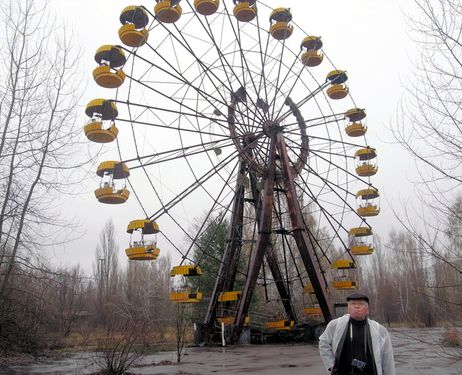|
Japan Writers' Group
Eye-opener in Chernobyl

Fukushima Nuclear Crisis
Magnetic Field Detector
May 02, 2012
If the pen is mightier than the sword, then
senior members of the Japan writers' P.E.N. Club, who
visited the shuttered
Chernobyl nuclear power plant in mid-April, are now
armed with some mighty ink.
"I thought I was going to learn lessons from
Chernobyl, where 26 years have passed since the disaster,
but what I discovered there is that the damage was still
ongoing," said Eto Mori, a P.E.N. Club board member.
Eight senior members of the Japan P.E.N. Club,
the Japanese affiliate of the International P.E.N. Club,
visited the Ukraine in mid-April to gain hands-on knowledge
of the effects of the Chernobyl nuclear disaster of 1986.
The objective of the trip was to "think about
the future of Fukushima and the children," the participants
said, referring to the crisis at the Fukushima No. 1 nuclear
power plant that was triggered by the Great East Japan
Earthquake and tsunami in March last year.
Jiro Asada, the president of the association of
progressively minded writers, on April 25 reiterated his
opposition to the use of nuclear power.
"There is no end to the cleanup work," Asada
told a news conference. "The situation is hopeless. We
adults have to bear a responsibility for the future."
The Japan P.E.N. Club held a meeting to think
about a nuclear phaseout last autumn. It also sent a
delegation to Fukushima in March and issued a statement in
April against restarting reactors at the Oi nuclear power
plant in Fukui Prefecture.
Delegation members had to cross a checkpoint to
enter a zone within a 30-kilometer radius of the Chernobyl
plant. The radiation levels hovered around 5-6 microsieverts
per hour when they visited the plant.
The visitors saw cracks in concrete members of a
shelter that was designed to contain radioactive materials.
About 3,000 people continue to work on the site to build a
new shelter and to continue the decommissioning process.
According to reports, construction costs for the
new shelter are estimated at 1.5 billion euros ($2 billion,
or 162 billion yen). The process relies on funding by
European nations, which--ironically enough--is creating jobs
for the local communities.
"Some say that nuclear power benefits the
economy," said Atsuo Nakamura, another P.E.N. Club board
member. "That may be a joke in the opposite sense."
The names of more than 100 abandoned villages,
which remain uninhabitable to this day, are engraved on a
monument in a park 17 km from the nuclear plant.
"It has been demonstrated that it is impossible
to decontaminate vast forested areas," Nakamura said. "And
Japan is a country of forests and mountains."
At a hospital in Narodychi, 60 km from the
Chernobyl nuclear plant, patients were taking radioactive
iodine as a cancer treatment in an isolation ward with
lead-embedded walls.
One man, who was 8 years old at the time of the
disaster, developed cancer in his thyroid gland this year.
The Institute of Endocrinology and Metabolism in
the Ukrainian capital of Kiev told the delegation that only
2.5 percent of children, who had been exposed to radiation
prenatally, were diagnosed as healthy at the age of 7.
Medical equipment in local facilities was old
and shabby. Medical practitioners in the Ukraine told the
P.E.N. Club delegates that modern Japanese medical
technology must be reassuring.
"Japan may certainly have wonderful medical
technologies, but do we have the software that allows us to
make full use of them?" Asada asked. "Will we be able to do
so under the leadership of politicians? Be it in science and
technology or in medicine, Japan's prestige is in danger of
falling to the ground. It's a very crucial moment for us."
http://www.emfnews.org/store |
